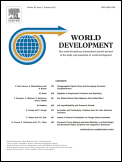Yes, it does.
At least, that is my answer to the question in a new article of mine titled “As You Sow, So Shall You Reap: The Welfare Impacts of Contract Farming,” which is forthcoming in World Development.
More specifically, I try to estimate the causal impacts of participation in contract farming — the economic institution in which a processing firm contracts its production of agricultural commodities out to grower households, or the first link in an agricultural value chain — on the welfare of the smallholders.
The major difficulty with studying such problems is that households are not randomly assigned to the treatment (i.e., participants in contract farming) and control (i.e., nonparticipants in contract farming) groups.
The smallholders who choose to participate in agricultural value chains do so following systematic patterns. The problem is that the researcher has no idea what those patterns are, as they often involve variables that are unobserved.
For example, it could be that more entrepreneurial smallholders are less likely to participate in agricultural value chains because they have better options. Or it could be that smallholders who are risk-averse are more likely to participate in agricultural value chains because contract farming partially insures them against income risk. But if it is difficult to measure risk aversion, it is even more difficult to measure entrepreneurial ability.
In this paper, I use an experimentally-derived measure of willingness to pay to participate in contract farming to measure people’s marginal utility from doing so. This setup allows me to control for the variation in marginal utility due to differences in entrepreneurial ability, risk aversion, technical ability, time preferences, etc., and so to eliminate a great deal of unobserved heterogeneity between smallholders.
More specifically, I use the respondent’s responses to the contingent valuation experiment used to elicit willingness to pay as a set of instrumental variables. This isn’t the ideal setup — that would involve randomly assigning smallholders to participation or nonparticipation — but I believe it is a net improvement on the methods used in previous studies. In short, this makes for greater internal validity than most previous studies.
In addition, I sample from a much broader base of contract farming agreements than most previous studies do, as I look at contract farming across several commodities, processing firms, and regions of Madagascar. This makes for greater external validity than most previous studies.
At the end of the day, I find that contract farming significantly increases the income of participants. Perhaps more importantly, I find that contract farming increases the income net of contract farming revenue of participants. In other words, there are positive spillovers on other sources of income (here, income from from sales of livestock and income from other agricultural sources such as the sales of non-contracted crops and animal byproducts).
Moreover, a comparison of my methodology with the propensity score matching method (which is unfortunately all-too-popular in this literature) shows that the latter considerably overestimates the welfare impacts of contract farming. Let’s hope this is the last nail in the coffin of PSM methods in the context of this literature.
The empirical setup in this paper This paper was a tough sell. One referee, in particular, seemed bent on finding every single flaw with the paper, as he (or she) wrote up six single-spaced pages of (often unnecessarily aggressive) comments. Fortunately, many of those comments were demonstrably wrong, and the other two referees made very constructive remarks, which respectively led me to think very carefully about the assumptions required to use treatment regressions and about whether I was estimating local average treatment effects. This ultimately made for a much better paper. Stay tuned for a post summarizing my advice on refereeing later on this week tomorrow.
For the one or two of you who will have read this far, here is the abstract of the article:
Contract farming is widely perceived as a means of increasing welfare in developing countries. Because of smallholder self-selection in contract farming, it is not clear whether contract farming actually increases grower welfare. In an effort to improve upon existing estimates of the welfare impacts of contract farming, this paper uses the results of a contingent-valuation experiment to control for unobserved heterogeneity among smallholders. Using data across several regions, firms, and crops in Madagascar, results indicate that a 1-percent increase in the likelihood of participating in contract farming is associated with a 0.5-percent increase in household income, among other positive impacts.
